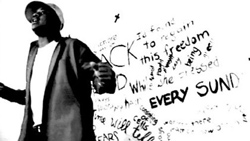All Events

Cup of Culture
Say My Name
MCC THEATER
In a hip hop and R’n’B world dominated by men and noted for misogyny, the unstoppable female lyricists of Say My Name speak candidly about class, race, and gender in pursuing their passions as female emcees. Nirit Peled, 75 min., English, 2009, UK/USA. Co-sponsored by the Black Student Union and the Women’s Center.

An Evening of Jazz with Sacred Urban Echoes
MCC THEATER
Iconic figures from the Los Angeles art scene, critically acclaimed vocalist Dwight Trible and award winning performance poet Kamau Daaood present an evening of socially conscious, spirited music and poetry spanning a spectrum from world music, spiritual jazz, to the avant-garde; all rooted deeply in African-American traditions. Celebrating their work together of over twenty years, Daaood and Trible will be supported by some of Los Angeles finest musicians and by members of the UCSB Black Student Union for a truly uplifting, inspiring, and thought provoking evening. Co-sponsored by the Black Student Union and Black Studies. Tickets $5 students / $15 general. Contact the A.S. Ticket Office at 805-893-2064.

Student Series
Still Black: A Portrait of Black Transmen
MCC THEATER
Still Black: A Portrait of Black Transmen is brought to life by the stories of six thoughtful, eloquent, and diverse transmen. Preachers, teachers, students, and activists educate us simply by making their presence known. Discussion with members of the Black Student Union following the screening. Kortney Ryan Ziegler, 78 min., English, 2008, USA. Co-sponsored by the Black Student Union and the Resource Center for Sexual and Gender Diversity.

Student Series
La Maricolectiva
MCC THEATER
In a mix of spoken word, slam poetry, cabaret and stand up, spanish, english y espanglish with a kick of jotaslang, la Jotísima trinidad de la Maricolectiva reclaims the jota/o experience and seeks to 'build a stage on top of the world' para las colored jotitas who speak softly y fiercely. The work of la Yosi, la Neza y la Xuanis started out of the necessity for queer Latino gender non-conforming immigrant voices across the southwest to be heard. This collective of jotas aims at giving priority to those voices that come from displacement, documenting the undocumented and creating a homeland using palabra, teatro, drag y jotería. Co-sponsored by De Colores and the Resource Center for Sexual and Gender Diversity.
